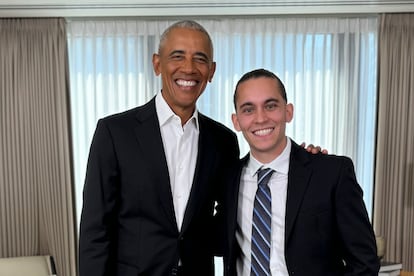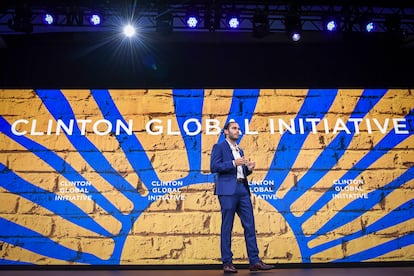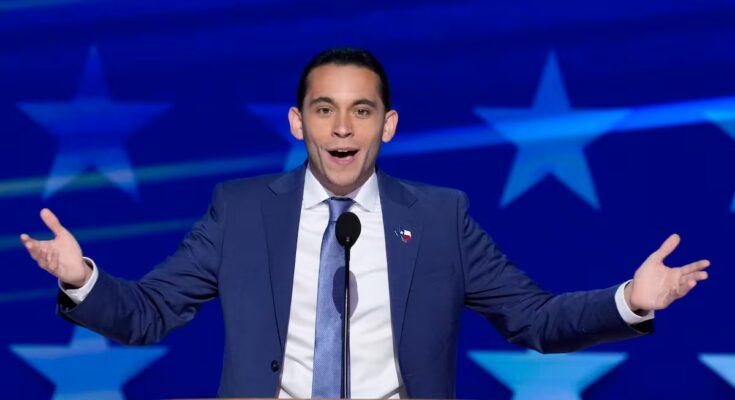Carlos Eduardo Espina would have been born in the United States if his Mexican mother had not been deported in 1997. But he was born in Uruguay, where his father, who lived in the United States and was already a citizen, came from. This allowed him to have American citizenship from birth, although five years passed, the years his mother needed to sort out his immigration status, until she and her son were reunited with his father in College Station, Texas. His origins predisposed Espina to want to help migrants.
Today, at 26 years old and with around 20 million followers on his social networks (more than 14 on Tik Tok and the rest on Instagram and Facebook), he is the oldest influencer for Latinos living in the United States, who are always addressed in Spanish. Espina talks to them about football, politics, food… but, above all, he explains the implications of immigration policy which, with the arrival of Donald Trump in the White House, has left millions of residents on the brink of deportation.
His ability to communicate and connect with the Latino community led the Joe Biden administration to turn to him on several occasions and he was invited to the Democratic Party National Convention.
Espina is the only Latino name to appear on Pew Research’s list of the most influential news commentators and ranks among the top 30 network content creators under 30 chosen by Forbes. The New York Times He described it as “a one-man Telemundo on TikTok.”
His reach with networks makes his social work easier. This Sunday it will host a charity soccer tournament in Houston featuring 50 content creators and former international players.
Ask. When did your activism with the immigrant community begin?
Answer. At the end of the Obama administration, many unaccompanied children began arriving from Honduras, Guatemala and El Salvador. Many ended up at my school and wanted to play on the soccer team, but couldn’t pass the classes because they didn’t know English. I acted as their interpreter and tutor. I realized that being bilingual is a superpower and that I could help a lot of people.
Q. When did you decide that your interest in helping migrants would define your professional life?
R. I wanted to become a professional footballer, but it was almost impossible and I didn’t know what I would do with my life. This coincided with the candidacy of Donald Trump in 2015, who in his speeches called Latinos rapists and criminals. One day I was watching football videos on Facebook and a Bernie Sanders ad came up saying the system is broken. I got really interested and started connecting things: that my friends are undocumented and how the system is unfair. That’s how I started doing more activism: I created a project to organize soccer camps for low-income children, I wrote letters to detained immigrants, I volunteered in non-profit organizations…
Q. How did the idea of making videos on social media for migrants come about?
R. I graduated with a degree in Political Science in May 2020 and my plan was to work at a non-profit organization that lost funding due to the pandemic. So I started making videos about the citizenship test.
Q. When did you start to realize that your idea was successful?
R. When I started I was at home (due to the pandemic) and I saw the numbers going up, but I didn’t really understand what it meant. After a year, already with the vaccine, I went to a market in Dallas where there are a lot of Latinos and suddenly I saw that a lot of people were looking at me. In a few minutes a queue of 50 people formed asking me for photos. I already had a million and a half followers, but that’s when I realized that those million and a half people who follow me are not just a number on social media, but are real people.
Now that I have more than 20 million followers, I’m used to it. The last time I went to a restaurant in Washington, the waiter came up to me and said, “Hey, you’re the one from TikTok, right? Could you come to the kitchen where everyone knows you?” These experiences happen to me often.
Q. What do you think is the reason for your success?
R. It has to do with the fact that what I’m doing is a trajectory that started before social media. Because I’ve been so connected since I was a child with the immigrant community, I’ve learned terms, ways of expressing myself, customs, cultural things, and you connect. Not all my videos are political: “Look, I came to eat at the restaurant”… and people like it that way. It connects you on a personal level, and since I studied law, I can take a Supreme Court decision, which 95% of the population doesn’t understand, and condense it into a video simply and easily. This was the great value I brought to people.
Q. What is the profile of your followers?
R. Curiously, over 80% are people between 30 and 45-50 years old. It’s interesting because people assume they’re 15 years old. 99% of followers are Latino. Latino immigrants in the United States work longer hours than any other group, up to 14 hours a day. They have very little free time and it’s easier for them to go on TikTok and watch my videos than to come home, turn on the TV and see what’s relevant. But, even if the majority belongs to the working class, there are also presidents who follow me.
It is very common that if I go to meet a senator in Washington DC, his Latino staff tells me that his parents or they follow me. Today I upload a video and they are seeing it in Congress, in the Senate. It’s something very, very shocking.

Q. It’s a great responsibility that so many people trust what you tell them. Are you afraid of making mistakes when dealing with delicate issues such as immigration at a time like the current one?
R. I try to be ethical and honest. They always ask me if I consider myself a journalist and not. First because I didn’t study journalism and second because I’m not impartial. As long as people understand that there are no problems. The problem is when content creators like me tell you “listen to me instead of traditional media”.
Q. The situation for Latin Americans took a radical turn with the arrival of Donald Trump in the White House. What has changed for you?
R. It’s been a really tough year. Not only from the content side, but also from the human side. I had to learn to do my job of informing and helping people without getting emotionally involved in the problems. I receive 10 or 15 videos a day of raids, of operations of people being arrested, and if I start crying over each of these cases I will never be able to do anything. The dynamics have changed a lot, in the sense that there is news of cases 24 hours a day. And they are no longer a source of information, but a source of confirmation. When it became known that immigration was going to North Carolina, there were people who said they didn’t believe it until I said it. A year has passed without holidays. I upload 15 videos a day because that’s the limit I set for myself, but it could easily be 30 or 40, with everything going on.
Q. Even from a financial point of view it will have been a rich year…
R. Not much more than last year. I earn most of my income through partnerships with remittance brands, immigration lawyers, health clinics, etc. It’s consistent. My opinions and followers have grown a lot, but political content on social media itself doesn’t monetize as much as other content. For example on TikTok there are months where I have up to a billion views and they pay you five thousand dollars. It’s not bad money, but for the number of views… Every platform is different and social networks are not stable. Last year you earned very little on Facebook and you earned more on TikTok. Now earn more on Facebook. But I enjoy it and do it better than any other job.

Q. Do you think Latinos are well represented in US media?
R. English-language media continues to fail to understand the Latino community. I was surprised by how many media outlets were surprised by how many Latinos voted for Donald Trump in 2024. I expected it. Now they wonder how it is possible that only 18% of Latinos support Trump while a few months ago more than 40% did. For me these are very logical things. In some ways, the fact that Trump won was good – if I can say that – for Americans to finally pay more attention to the issue of immigration and the injustices that have been experienced not only during this administration, but for decades in this country.
Q. Is there a video you’ve had trouble getting out there?
R. When Donald Trump won the election. I was inside shock. It was like no, this can’t be, how are we going to go back to this guy if we’ve already been living with him for four years. The next day I woke up discouraged, but life goes on and that same day I uploaded another twenty videos. If I don’t make the videos where Donald Trump won, someone else will. The brutality of social networks is that people will continue to consume them, whether you are there or not. If you disappear for a few days, someone else comes along and eats your work.
Q. What future plans do you have?
R. I give the vast majority of what the networks give. Hopefully things will calm down a bit so I can continue doing soccer camps, community events and other things I’m passionate about. I like social networks, but it’s very tiring to spend all day on the phone making videos. Right now, even if I wanted to leave social media, I can’t because of all the people who see me and follow me, which depends on the information I give out, but I wouldn’t want to do that for the rest of my life.


